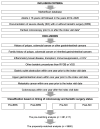The Risk of Colorectal Polyps after Weight Loss Therapy Versus Obesity: A Propensity-Matched Nationwide Cohort Study
- PMID: 37835515
- PMCID: PMC10571780
- DOI: 10.3390/cancers15194820
The Risk of Colorectal Polyps after Weight Loss Therapy Versus Obesity: A Propensity-Matched Nationwide Cohort Study
Abstract
Background: A fundamental understanding of the impact of bariatric surgery (BRS) on mechanisms of colorectal carcinogenesis is limited. For instance, studies report a reduced risk of colorectal cancer in females but not in males after BRS. We examined whether this sex-specific difference existed at the earlier polyp development stage.
Methods: This retrospective cohort study included 281,417 adults from the 2012-2020 MarketScan database. We compared polyps rates on colonoscopy in four groups: post- vs. pre-BRS (treatment) to post- vs. pre-severe obesity (SO) diagnosis (control). We focused our main analysis on a propensity-matched sample that yielded a balanced distribution of covariates in our four groups (n = 9680 adults, 21.9% males). We also adjusted for important covariates.
Results: Metabolic syndrome parameters improved after bariatric surgery and worsened after severe obesity diagnosis (p < 0.05). The rate of polyps was 46.7% at a median of 0.5 years pre-BRS and 47.9% at a median of 0.6 years pre-SO diagnosis. The polyps rate was 45.4% at a median (range) of 3.2 (1.0-8.5) years post-BRS. Conversely, 53.8% of adults had polyps at 3.0 (1.0-8.6) years post-SO. There was no change in the risk of colorectal polyps in males or females post- vs. pre-BRS. However, the risk of polyps was higher in males (OR = 1.32, 95% CI: 1.02-1.70) and females (OR = 1.29, 95% CI: 1.13-1.47) post- vs. pre-SO. When compared to the control group (SO), the odds ratios for colorectal polyps were lower for males and females after bariatric surgery (OR = 0.63, 95% CI: 0.44-0.90, and OR = 0.79, 95% CI: 0.66-0.96, respectively).
Conclusions: Obesity is associated with an increased risk of colorectal polyps, an effect that is ameliorated after bariatric surgery. These data are relevant for studies investigating colorectal carcinogenesis mechanisms.
Keywords: bariatric surgery; colorectal cancer; gastric bypass; risk factor; sleeve gastrectomy.
Conflict of interest statement
The authors have no relevant conflict of interest, including relevant financial interests, activities, relationships, or affiliations.
Figures
References
-
- Tran K.B., Lang J.J., Xu R., Compton k., Acheson A.R., Henrikson H.J., Kocarnik J.M., Penberthy L., Aali A., Abbas Q. The global burden of cancer attributable to risk factors, 2010–19: A systematic analysis for the Global Burden of Disease Study 2019. Lancet. 2022;400:563–591. doi: 10.1016/S0140-6736(22)01438-6. - DOI - PMC - PubMed
-
- Loosen S.H., Roderburg C., Jördens M.S., Fluegen G., Luedde T., Kostev K. Overweight and Obesity Determine the Risk for Gastrointestinal Cancer in a Sex-Dependent Manner: A Retrospective Cohort Study of 287,357 Outpatients in Germany. Cancers. 2022;14:931. doi: 10.3390/cancers14040931. - DOI - PMC - PubMed
Grants and funding
LinkOut - more resources
Full Text Sources



